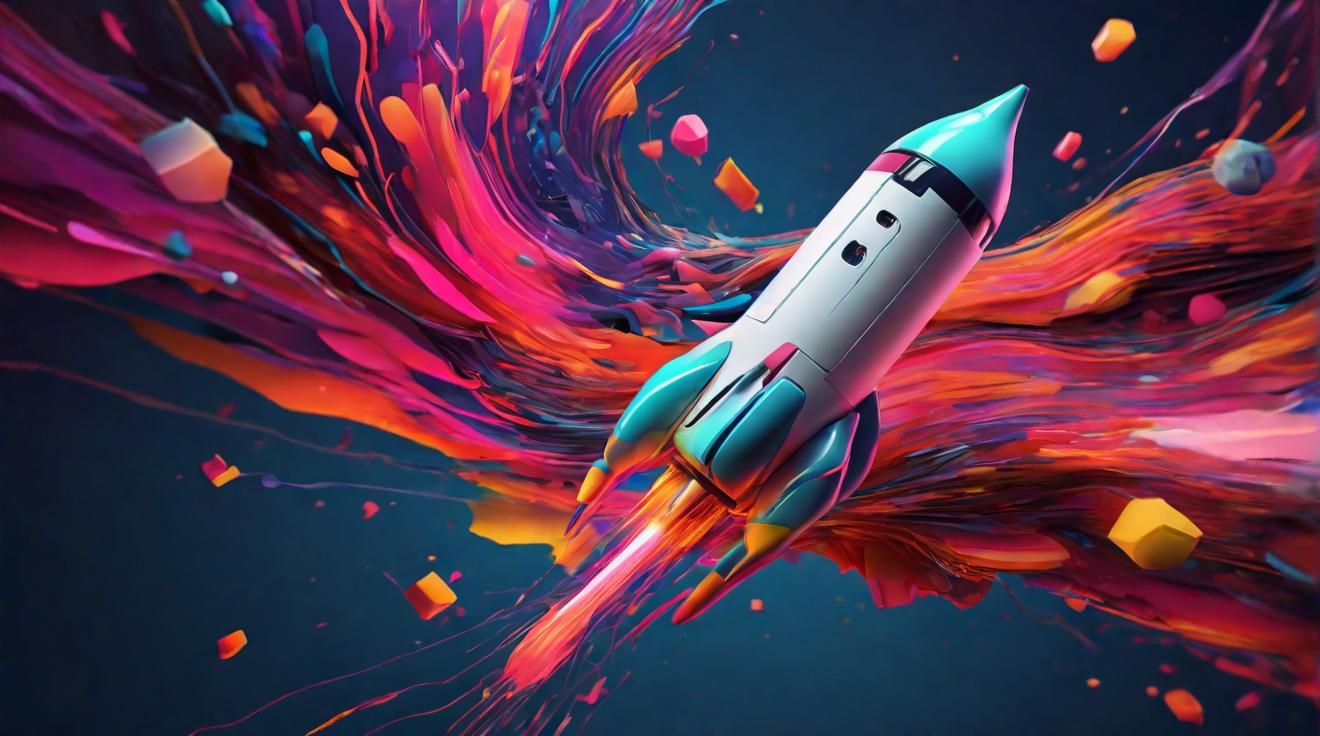Spotify’s collaboration with major record labels marks a significant step toward integrating AI responsibly within the music industry. By prioritizing artist consent and compensation, Spotify aims to mitigate risks associated with unregulated AI-generated content while fostering innovation. !-- wp:paragraph -->
Contents
FinOracleAI — Market ViewFinOracleAI — Market ViewEstablishing a Generative AI Research Lab to Drive InnovationFinOracleAI — Market ViewEstablishing a Generative AI Research Lab to Drive InnovationFinOracleAI — Market ViewArtist Empowerment Through Opt-In AI Usage and CompensationEstablishing a Generative AI Research Lab to Drive InnovationFinOracleAI — Market ViewArtist Empowerment Through Opt-In AI Usage and CompensationEstablishing a Generative AI Research Lab to Drive InnovationFinOracleAI — Market ViewExisting AI Features and the Need for Artist ControlArtist Empowerment Through Opt-In AI Usage and CompensationEstablishing a Generative AI Research Lab to Drive InnovationFinOracleAI — Market ViewExisting AI Features and the Need for Artist ControlArtist Empowerment Through Opt-In AI Usage and CompensationEstablishing a Generative AI Research Lab to Drive InnovationFinOracleAI — Market ViewSpotify Partners with Major Labels to Develop Artist-First AI Music ProductsExisting AI Features and the Need for Artist ControlArtist Empowerment Through Opt-In AI Usage and CompensationEstablishing a Generative AI Research Lab to Drive InnovationFinOracleAI — Market View
- Opportunities: Enhanced artist control may lead to broader adoption of AI tools, unlocking new creative possibilities and revenue streams.
- Risks: Implementation challenges in tracking AI usage and ensuring fair compensation could hinder the rollout and acceptance.
- Potential industry leadership in setting ethical standards for AI in music creation.
- Strengthening copyright enforcement may reduce unauthorized AI-generated content and protect artistic integrity.
FinOracleAI — Market View
Spotify’s collaboration with major record labels marks a significant step toward integrating AI responsibly within the music industry. By prioritizing artist consent and compensation, Spotify aims to mitigate risks associated with unregulated AI-generated content while fostering innovation. !-- wp:paragraph -->- Opportunities: Enhanced artist control may lead to broader adoption of AI tools, unlocking new creative possibilities and revenue streams.
- Risks: Implementation challenges in tracking AI usage and ensuring fair compensation could hinder the rollout and acceptance.
- Potential industry leadership in setting ethical standards for AI in music creation.
- Strengthening copyright enforcement may reduce unauthorized AI-generated content and protect artistic integrity.
FinOracleAI — Market View
Spotify’s collaboration with major record labels marks a significant step toward integrating AI responsibly within the music industry. By prioritizing artist consent and compensation, Spotify aims to mitigate risks associated with unregulated AI-generated content while fostering innovation. !-- wp:paragraph -->- Opportunities: Enhanced artist control may lead to broader adoption of AI tools, unlocking new creative possibilities and revenue streams.
- Risks: Implementation challenges in tracking AI usage and ensuring fair compensation could hinder the rollout and acceptance.
- Potential industry leadership in setting ethical standards for AI in music creation.
- Strengthening copyright enforcement may reduce unauthorized AI-generated content and protect artistic integrity.
“Some voices in the tech industry believe copyright should be abolished. We don’t. Musicians’ rights matter. Copyright is essential,” Spotify stated. “If the music industry doesn’t lead in this moment, AI-powered innovation will happen elsewhere, without rights, consent, or compensation. Together with rights holders, artists, and songwriters, we are making significant investments in AI research and product development.”Establishing a Generative AI Research Lab to Drive Innovation
To support this vision, Spotify has launched a dedicated generative AI research lab and product team focused on developing technologies that align with their principles of artist choice and fair participation in AI music creation. !-- wp:paragraph --> Work on initial products is already underway, with further AI tools expected to be introduced in the near future. !-- wp:paragraph -->FinOracleAI — Market View
Spotify’s collaboration with major record labels marks a significant step toward integrating AI responsibly within the music industry. By prioritizing artist consent and compensation, Spotify aims to mitigate risks associated with unregulated AI-generated content while fostering innovation. !-- wp:paragraph -->- Opportunities: Enhanced artist control may lead to broader adoption of AI tools, unlocking new creative possibilities and revenue streams.
- Risks: Implementation challenges in tracking AI usage and ensuring fair compensation could hinder the rollout and acceptance.
- Potential industry leadership in setting ethical standards for AI in music creation.
- Strengthening copyright enforcement may reduce unauthorized AI-generated content and protect artistic integrity.
“Some voices in the tech industry believe copyright should be abolished. We don’t. Musicians’ rights matter. Copyright is essential,” Spotify stated. “If the music industry doesn’t lead in this moment, AI-powered innovation will happen elsewhere, without rights, consent, or compensation. Together with rights holders, artists, and songwriters, we are making significant investments in AI research and product development.”Establishing a Generative AI Research Lab to Drive Innovation
To support this vision, Spotify has launched a dedicated generative AI research lab and product team focused on developing technologies that align with their principles of artist choice and fair participation in AI music creation. !-- wp:paragraph --> Work on initial products is already underway, with further AI tools expected to be introduced in the near future. !-- wp:paragraph -->FinOracleAI — Market View
Spotify’s collaboration with major record labels marks a significant step toward integrating AI responsibly within the music industry. By prioritizing artist consent and compensation, Spotify aims to mitigate risks associated with unregulated AI-generated content while fostering innovation. !-- wp:paragraph -->- Opportunities: Enhanced artist control may lead to broader adoption of AI tools, unlocking new creative possibilities and revenue streams.
- Risks: Implementation challenges in tracking AI usage and ensuring fair compensation could hinder the rollout and acceptance.
- Potential industry leadership in setting ethical standards for AI in music creation.
- Strengthening copyright enforcement may reduce unauthorized AI-generated content and protect artistic integrity.
Artist Empowerment Through Opt-In AI Usage and Compensation
The forthcoming generative AI tools will enable artists to opt in to AI usage, ensuring they maintain agency over how their music is incorporated into AI-generated works. The system is expected to track when artists’ music is used and facilitate appropriate compensation. !-- wp:paragraph --> Spotify also intends to extend these protections to other rights holders and distributors, reinforcing a comprehensive rights management framework within the emerging AI music ecosystem. !-- wp:paragraph -->“Some voices in the tech industry believe copyright should be abolished. We don’t. Musicians’ rights matter. Copyright is essential,” Spotify stated. “If the music industry doesn’t lead in this moment, AI-powered innovation will happen elsewhere, without rights, consent, or compensation. Together with rights holders, artists, and songwriters, we are making significant investments in AI research and product development.”Establishing a Generative AI Research Lab to Drive Innovation
To support this vision, Spotify has launched a dedicated generative AI research lab and product team focused on developing technologies that align with their principles of artist choice and fair participation in AI music creation. !-- wp:paragraph --> Work on initial products is already underway, with further AI tools expected to be introduced in the near future. !-- wp:paragraph -->FinOracleAI — Market View
Spotify’s collaboration with major record labels marks a significant step toward integrating AI responsibly within the music industry. By prioritizing artist consent and compensation, Spotify aims to mitigate risks associated with unregulated AI-generated content while fostering innovation. !-- wp:paragraph -->- Opportunities: Enhanced artist control may lead to broader adoption of AI tools, unlocking new creative possibilities and revenue streams.
- Risks: Implementation challenges in tracking AI usage and ensuring fair compensation could hinder the rollout and acceptance.
- Potential industry leadership in setting ethical standards for AI in music creation.
- Strengthening copyright enforcement may reduce unauthorized AI-generated content and protect artistic integrity.
Artist Empowerment Through Opt-In AI Usage and Compensation
The forthcoming generative AI tools will enable artists to opt in to AI usage, ensuring they maintain agency over how their music is incorporated into AI-generated works. The system is expected to track when artists’ music is used and facilitate appropriate compensation. !-- wp:paragraph --> Spotify also intends to extend these protections to other rights holders and distributors, reinforcing a comprehensive rights management framework within the emerging AI music ecosystem. !-- wp:paragraph -->“Some voices in the tech industry believe copyright should be abolished. We don’t. Musicians’ rights matter. Copyright is essential,” Spotify stated. “If the music industry doesn’t lead in this moment, AI-powered innovation will happen elsewhere, without rights, consent, or compensation. Together with rights holders, artists, and songwriters, we are making significant investments in AI research and product development.”Establishing a Generative AI Research Lab to Drive Innovation
To support this vision, Spotify has launched a dedicated generative AI research lab and product team focused on developing technologies that align with their principles of artist choice and fair participation in AI music creation. !-- wp:paragraph --> Work on initial products is already underway, with further AI tools expected to be introduced in the near future. !-- wp:paragraph -->FinOracleAI — Market View
Spotify’s collaboration with major record labels marks a significant step toward integrating AI responsibly within the music industry. By prioritizing artist consent and compensation, Spotify aims to mitigate risks associated with unregulated AI-generated content while fostering innovation. !-- wp:paragraph -->- Opportunities: Enhanced artist control may lead to broader adoption of AI tools, unlocking new creative possibilities and revenue streams.
- Risks: Implementation challenges in tracking AI usage and ensuring fair compensation could hinder the rollout and acceptance.
- Potential industry leadership in setting ethical standards for AI in music creation.
- Strengthening copyright enforcement may reduce unauthorized AI-generated content and protect artistic integrity.
Existing AI Features and the Need for Artist Control
Spotify already offers several generative AI experiences, such as its AI DJ feature that curates personalized song selections and playlist generation through AI prompts. However, the platform recently faced criticism for viral AI-generated music by an entirely artificial band, sparking debate about the future role of human creativity in music. !-- wp:paragraph --> In response, Spotify has taken measures to refine its AI content policies, including cracking down on spam uploads, duplicate tracks, and manipulation of recommendation algorithms. Moreover, Spotify plans to implement DDEX music labeling to clearly identify AI-involved content. !-- wp:paragraph -->Artist Empowerment Through Opt-In AI Usage and Compensation
The forthcoming generative AI tools will enable artists to opt in to AI usage, ensuring they maintain agency over how their music is incorporated into AI-generated works. The system is expected to track when artists’ music is used and facilitate appropriate compensation. !-- wp:paragraph --> Spotify also intends to extend these protections to other rights holders and distributors, reinforcing a comprehensive rights management framework within the emerging AI music ecosystem. !-- wp:paragraph -->“Some voices in the tech industry believe copyright should be abolished. We don’t. Musicians’ rights matter. Copyright is essential,” Spotify stated. “If the music industry doesn’t lead in this moment, AI-powered innovation will happen elsewhere, without rights, consent, or compensation. Together with rights holders, artists, and songwriters, we are making significant investments in AI research and product development.”Establishing a Generative AI Research Lab to Drive Innovation
To support this vision, Spotify has launched a dedicated generative AI research lab and product team focused on developing technologies that align with their principles of artist choice and fair participation in AI music creation. !-- wp:paragraph --> Work on initial products is already underway, with further AI tools expected to be introduced in the near future. !-- wp:paragraph -->FinOracleAI — Market View
Spotify’s collaboration with major record labels marks a significant step toward integrating AI responsibly within the music industry. By prioritizing artist consent and compensation, Spotify aims to mitigate risks associated with unregulated AI-generated content while fostering innovation. !-- wp:paragraph -->- Opportunities: Enhanced artist control may lead to broader adoption of AI tools, unlocking new creative possibilities and revenue streams.
- Risks: Implementation challenges in tracking AI usage and ensuring fair compensation could hinder the rollout and acceptance.
- Potential industry leadership in setting ethical standards for AI in music creation.
- Strengthening copyright enforcement may reduce unauthorized AI-generated content and protect artistic integrity.
Existing AI Features and the Need for Artist Control
Spotify already offers several generative AI experiences, such as its AI DJ feature that curates personalized song selections and playlist generation through AI prompts. However, the platform recently faced criticism for viral AI-generated music by an entirely artificial band, sparking debate about the future role of human creativity in music. !-- wp:paragraph --> In response, Spotify has taken measures to refine its AI content policies, including cracking down on spam uploads, duplicate tracks, and manipulation of recommendation algorithms. Moreover, Spotify plans to implement DDEX music labeling to clearly identify AI-involved content. !-- wp:paragraph -->Artist Empowerment Through Opt-In AI Usage and Compensation
The forthcoming generative AI tools will enable artists to opt in to AI usage, ensuring they maintain agency over how their music is incorporated into AI-generated works. The system is expected to track when artists’ music is used and facilitate appropriate compensation. !-- wp:paragraph --> Spotify also intends to extend these protections to other rights holders and distributors, reinforcing a comprehensive rights management framework within the emerging AI music ecosystem. !-- wp:paragraph -->“Some voices in the tech industry believe copyright should be abolished. We don’t. Musicians’ rights matter. Copyright is essential,” Spotify stated. “If the music industry doesn’t lead in this moment, AI-powered innovation will happen elsewhere, without rights, consent, or compensation. Together with rights holders, artists, and songwriters, we are making significant investments in AI research and product development.”Establishing a Generative AI Research Lab to Drive Innovation
To support this vision, Spotify has launched a dedicated generative AI research lab and product team focused on developing technologies that align with their principles of artist choice and fair participation in AI music creation. !-- wp:paragraph --> Work on initial products is already underway, with further AI tools expected to be introduced in the near future. !-- wp:paragraph -->FinOracleAI — Market View
Spotify’s collaboration with major record labels marks a significant step toward integrating AI responsibly within the music industry. By prioritizing artist consent and compensation, Spotify aims to mitigate risks associated with unregulated AI-generated content while fostering innovation. !-- wp:paragraph -->- Opportunities: Enhanced artist control may lead to broader adoption of AI tools, unlocking new creative possibilities and revenue streams.
- Risks: Implementation challenges in tracking AI usage and ensuring fair compensation could hinder the rollout and acceptance.
- Potential industry leadership in setting ethical standards for AI in music creation.
- Strengthening copyright enforcement may reduce unauthorized AI-generated content and protect artistic integrity.
Spotify Partners with Major Labels to Develop Artist-First AI Music Products
On October 16, 2025, Spotify announced strategic agreements with leading record labels including Sony, Universal, Warner, and Merlin to co-create new AI-driven music products designed with a primary focus on artist rights and fair remuneration. !-- wp:paragraph --> The initiative aims to establish “responsible AI” solutions that uphold copyright protections and empower artists and songwriters to decide whether their works can be utilized by AI technologies. !-- wp:paragraph -->Existing AI Features and the Need for Artist Control
Spotify already offers several generative AI experiences, such as its AI DJ feature that curates personalized song selections and playlist generation through AI prompts. However, the platform recently faced criticism for viral AI-generated music by an entirely artificial band, sparking debate about the future role of human creativity in music. !-- wp:paragraph --> In response, Spotify has taken measures to refine its AI content policies, including cracking down on spam uploads, duplicate tracks, and manipulation of recommendation algorithms. Moreover, Spotify plans to implement DDEX music labeling to clearly identify AI-involved content. !-- wp:paragraph -->Artist Empowerment Through Opt-In AI Usage and Compensation
The forthcoming generative AI tools will enable artists to opt in to AI usage, ensuring they maintain agency over how their music is incorporated into AI-generated works. The system is expected to track when artists’ music is used and facilitate appropriate compensation. !-- wp:paragraph --> Spotify also intends to extend these protections to other rights holders and distributors, reinforcing a comprehensive rights management framework within the emerging AI music ecosystem. !-- wp:paragraph -->“Some voices in the tech industry believe copyright should be abolished. We don’t. Musicians’ rights matter. Copyright is essential,” Spotify stated. “If the music industry doesn’t lead in this moment, AI-powered innovation will happen elsewhere, without rights, consent, or compensation. Together with rights holders, artists, and songwriters, we are making significant investments in AI research and product development.”Establishing a Generative AI Research Lab to Drive Innovation
To support this vision, Spotify has launched a dedicated generative AI research lab and product team focused on developing technologies that align with their principles of artist choice and fair participation in AI music creation. !-- wp:paragraph --> Work on initial products is already underway, with further AI tools expected to be introduced in the near future. !-- wp:paragraph -->FinOracleAI — Market View
Spotify’s collaboration with major record labels marks a significant step toward integrating AI responsibly within the music industry. By prioritizing artist consent and compensation, Spotify aims to mitigate risks associated with unregulated AI-generated content while fostering innovation. !-- wp:paragraph -->- Opportunities: Enhanced artist control may lead to broader adoption of AI tools, unlocking new creative possibilities and revenue streams.
- Risks: Implementation challenges in tracking AI usage and ensuring fair compensation could hinder the rollout and acceptance.
- Potential industry leadership in setting ethical standards for AI in music creation.
- Strengthening copyright enforcement may reduce unauthorized AI-generated content and protect artistic integrity.













